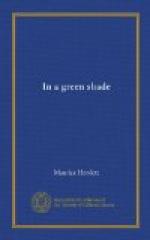She is at her full, and even as I write rising red and heavy in the south-west. All night long she will look down upon at least one corner of the earth satiate with the good things of life. I don’t remember such a September as this has been for many years past. Misty, gossamered mornings, a day all blue and pale gold, bees in the ivy bloom, sprawling overblown flowers, red apples, purpling vine-clusters, clear evenings: then this smouldering moon to go to bed by! It is all like a great Veronese wall-picture, or the Masque in The Tempest—“Rich scarf to my proud earth!”—and summons from me more adjectives than I have needed this twelvemonth. It is indeed adjectival weather; for Nature is still adding, not discarding stores. The last act of the “maturing sun” is to ingerminate the flowers and fruit which will bless or tantalise us next year.
Now is the time when maids get up at six and hunt for mushrooms in the dew; now the good wives of the village make wine of all sorts of unlikely fruits, blackberries, elderberries, peaches, pears, and, of all things in the world, parsnips. I have lately been given of this wine to taste. It is a cordial rather than a wine and on the good rather than the bad side. The addition of spices is admitted; nevertheless out of a particularly mawkish vegetable is made a palatable drink. “Out of the strong come forth sweetness.” After it I shall be prepared to find a potable in the banana, which is favoured by many people, of whom I am not one. But I don’t find it nastier than the parsnip, and it is evident that fermentation can work miracles.
In such a year as this I, too, shall have a vintage. For the first time in my life I shall tread my own winepress, vat my own must, and (I hope) need no sugar for it. I don’t know why it is, but I can conceive no more romantic rural adventure than that of growing and drinking your own wine. But there are yet many things to happen. The grapes must get ripe and the wasps be kept off; and then there are problems connected with vinification which I have not yet solved. The Marquis of Bute could tell me all about it, and I wish he would. He has made wine at Castle Coch these many years, and of the most excellent. Unfortunately I have not his acquaintance, so I invite advice, and shall be grateful for it. The chief of my perplexities are concerned with the beginning of fermentation and the end of it. For the first, should I use yeast? My neighbours here say, yes; the French tell me that I don’t need it, the grapes having enough of their own. Pass that and consider the second point. Having started your ferment, how do you stop it?[A] Fermentation in Italy goes on in the barrel, after the liquor has left the vat. That gives you a peculiar prickly wine which the Italians call “Frizzante” and profess to like. Our word for it is “beastly.”
[Footnote A: Since that was written I have learned the answer. It stops itself—why, I don’t know, unless by the grace of God.]




